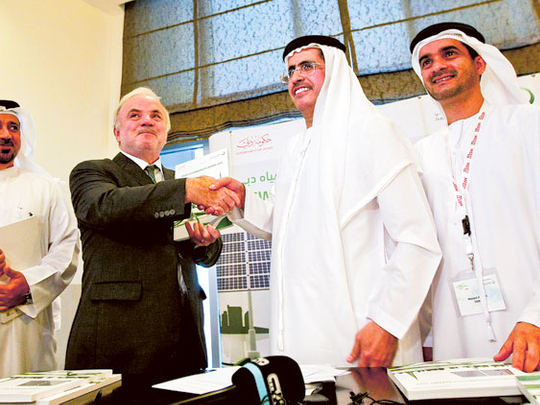
Dubai: Using renewable energy in the Mena region remains an ambitious target and is not translating into actual programmes for many member countries, except for Morocco and the UAE.
This was revealed in the two-day Dubai Clean Energy Forum on Tuesday, organised by the Dubai Electricity and Water Authority (Dewa) with the support of the Dubai Supreme Council of Energy, in partnership with MEED (senior management media brand).
The forum, attended by delegates from here and abroad, addresses clean energy solutions, opportunities, and new technologies to help speed up the adoption of renewable energy in the region.
Some countries are moving while others are struggling in turning their clean energy targets into actual projects to benefit end-users, Ed James, Director of Analysis at MEED Projects, said during the forum, citing MEED’s study on the Mena Renewable Energy Market.
These targets refer to a country’s objective of lessening its dependence on fossil fuel and coal and include clean energy such as wind, solar, and nuclear in its energy mix by 2020.
“Dubai is the exception, along with other countries such as Morocco. Dubai is acting faster than most other countries. And like we’ve seen before in other sectors of Dubai, once it has made a strategy, it goes ahead with it and it’s moving fast. Within a short amount of time, it has overtaken some other countries which had started their renewable energy programmes earlier,” James told Gulf News.
James said that within just a span of two years, Dubai has accelerated its renewable energy programme not just in terms of the first phase of the Mohammad Bin Rashid Al Maktoum Solar Park, which is now operational, but also in launching the region’s first clean coal project.
Having the Supreme Council dedicated to achieving the targets is key to Dubai’s success story as there’s certainty in decision-making and strategy implementation, James said.
In his keynote speech, Saeed Mohammad Al Tayer, managing director and CEO of Dewa, said that Dewa is making every effort to protect the environment and save Dubai’s resources.
“Today, Dubai is a pioneer in all areas of development. At Dewa, we seek to achieve a host of objectives, at the top of which are protecting the environment and its natural balance through a comprehensive and sustainable development for the benefit of future generations…” Al Tayer said.
As part of the Dubai Integrated Energy Strategy 2030, Dubai aims to reduce gas use to 71 per cent, and mix its energy sources by depending 12 per cent on nuclear energy, 12 per cent on clean coal and five per cent on solar power in the next 16 years.
James said all indicators point to Dubai being on track in meeting these targets. The only thing lacking is for regulations to be put in place so that the greater majority, meaning Dubai households, can participate as well, such as use of rooftop solar panels.
“We are waiting now for the decree to be issued and I think it will be issued soon. This will, of course, encourage everybody to use the [solar power technology] in their houses,” Al Tayer told reporters.












